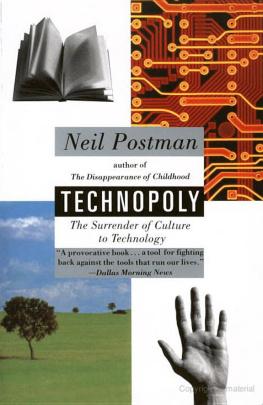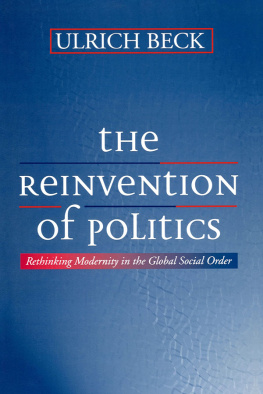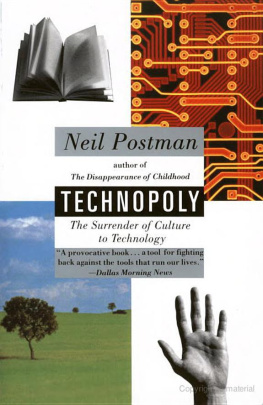Neil Postman
Technopoly
Neil Postman is a critic, communications theorist, and Chair of the Department of Communication Arts and Sciences at New York University. In 1987 he was given the George Orwell Award for Clarity in Language by the National Council of Teachers of English. In 1989 he received the Distinguished Professor Award at New York University. In the spring of 1991 he was Laurence Lombard Visiting Professor of the Press and Public Policy at Harvard University. For ten years he was editor of Et Cetera, the journal of General Semantics. His seventeen previous books include Teaching as a Subversive Activity (with Charles Weingartner), The Disappearance of Childhood, Amusing Ourselves to Death, and Conscientious Objections.
Bibliography
Al-Hibri, A., and Hickman, L. (eds.). Technology and Human Affairs. London: The C. V. Mosby Company, 1981.
Arendt, H. Eichmann in Jerusalem: A Report on the Banality of Evil. New York: Penguin Books, 1977.
Bellah, R. N.; Madsen, R.; Sullivan, W. H.; Swidler, A.; and Tipton, S. M. Habits of the Heart: Individualism and Commitment in American Life. Berkeley: University of California Press, 1985.
Beniger, J. R. The Control Revolution: Technological and Economic Origins of the Information Society. Cambridge, Mass., and London: Harvard University Press, 1986.
Bolter, J. D. Turings Man: Western Culture in the Computer Age. Chapel Hill: The University of North Carolina Press, 1984.
Bury, J. B. The Idea of Progress: An Inquiry into its Origin and Growth. New York: Dover Publications, Inc., 1932.
Callahan, R. E. Education and the Cult of Efficiency: A Study of the Social Forces That Have Shaped the Administration of the Public Schools. Chicago: The University of Chicago Press, 1962.
Christians, C. G., and Van Hook, J. M. (eds.). Jacques Ellul: Interpretive Essays. Chicago: University of Illinois Press, 1981.
Eisenstein, E. The Printing Revolution in Early Modern Europe. Cambridge, Mass.: Cambridge University Press, 1983.
Ellul, J. The Technological Society. New York: Alfred A. Knopf, 1964.
Ellul, J. The Betrayal of the West. New York: The Seabury Press, 1978.
Farrington, B. Francis Bacon: Philosopher of Industrial Science. New York: Henry Schuman, Inc., 1949.
Freud, S. Civilization and Its Discontents. New York: W. W. Norton & Co., 1961.
Gehlen, A. Man in the Age of Technology. New York: Columbia University Press, 1980.
Giedion, S. Mechanization Takes Command: A Contribution to Anonymous History. New York: W. W. Norton & Co., 1948.
Gimpel, J. The Medieval Machine: The Industrial Revolution of the Middle Ages. New York: Holt, Rinehart & Winston, 1976.
Gould, S. J. The Mismeasure of Man. New York: W. W. Norton & Co., 1981.
Gozzi, R., Jr. The Computer Virus as Metaphor, in Etcetera: A Review of General Semantics, vol. 47, no. 2 (Summer 1990).
Hayek, F. H. The Counter-Revolution of Science: Studies on the Abuse of Reason. Indianapolis: Liberty Press, 1952.
Hirsch, E. D., Jr. Cultural Literacy: What Every American Needs to Know. Boston: Houghton Mifflin Co., 1987.
Hodges, A. Alan Turing: The Enigma. New York: Simon & Schuster, 1983.
Hoffer, E. The Ordeal of Change. New York: Harper & Row, 1952.
Horowitz, L. C., M.D. Taking Charge of Your Medical Fate. New York: Random House, 1988.
Hunt, M. The Universe Within: A New Science Explores the Mind. New York: Simon & Schuster, 1982.
Hutchins, R. M. The Higher Learning in America. New Haven: Yale University Press, 1936.
Inlander, C. B.; Levin, L. S.; and Weiner, E. Medicine on Trial: The Appalling Story of Medical Ineptitude and the Arrogance that Overlooks It. New York: Pantheon Books, 1988.
Katsch, M. E. The Electronic Media and the Transformation of Law. New York and Oxford: Oxford University Press, 1989.
Koestler, A. The Sleepwalkers. New York: The Macmillan Company, 1068.
Lasch, C. Haven in a Heartless World: The Family Besieged. New York: Basic Books, Inc., 1975.
Lewis, C. S. The Screwtape Letters. New York: Macmillan, 1943.
Logan, R. K. The Alphabet Effect: The Impact of the Phonetic Alphabet on the Development of Western Civilization. New York: St. Martins Press, 1986.
Luke, C. Pedagogy, Printing, and Protestantism. Albany: State University of New York Press, 1989.
Marx, K., and Engels, F. The German Ideology. New York: International Publishers, 1972.
Milgram, S. Obedience to Authority: An Experimental View. New York: Harper & Row, 1974.
Muller, H. J. The Children of Frankenstein: A Primer on Modern Technology and Human Values. Bloomington and London: Indiana University Press, 1970.
Mumford, L. Technics and Civilization. New York: Harcourt Brace Jovanovich, 1963.
Myrdal, G. Objectivity in Social Research. New York: Pantheon Books, 1969.
Papert, S. Mindstorms: Children, Computers, and Powerful Ideas. New York-Basic Books, Inc., 1980.
Payer, L. Medicine and Culture: Varieties of Treatment in the United States, England, West Germany, and France. New York: Penguin Books, 1988.
Penzias, A. Ideas and Information: Managing in a High-Tech World. New York and London: W. W. Norton & Co., 1989.
Plato. Phaedrus and Letters VII and VIII. New York: Penguin Books, 1973.
Postman, N. Amusing Ourselves to Death: Public Discourse in the Age of Show Business. New York: Penguin Books, 1985.
Read, H. To Hell with Culture and Other Essays on Art and Society. New York: Schocken Books, 1963.
Reiser, S. J. Medicine and the Reign of Technology. Cambridge, London, New York and Melbourne: Cambridge University Press, 1978.
Rifkin, J. Time Wars: The Primary Conflict in Human History. New York: Henry Holt and Company, 1987.
Schumacher, E. F. Small Is Beautiful: Economics As If People Mattered. New York, Hagerstown, San Francisco and London: Harper & Row.
Schumacher, E. F. A Guide for the Perplexed. New York: Viking Penguin, Inc., 1977.
Searle, J. Minds, Brains and Science. Cambridge, Mass.: Harvard University Press, 1984.
Segal, H. P. Technological Utopianism in American Culture. Chicago: The University of Chicago Press, 1985.
Snow, C. P. The Two Cultures and the Scientific Revolution. New York: Cambridge University Press, 1959.
Sturt, M. Francis Bacon. New York: William Morrow & Company, 1932.
Szasz, T. Anti-Freud: Karl Krauss Criticism of Psychoanalysis and Psychiatry. Syracuse: Syracuse University Press, 1976.
Tocqueville, A. de. Democracy in America. New York: Anchor Books (Doubleday & Co., Inc.), 1969.
Usher, A. P. History of Mechanical Inventions. New York: Dover Publications, Inc., 1929.
Weingartner, C. Educational Research: The Romance of Quantification, Etcetera: A Review of General Semantics, vol. 39, no. 2 (Summer 1982).
Weizenbaum, J. Computer Power and Human Reason: From Judgment to Calculation. San Francisco: W. H. Freeman and Company, 1976.







